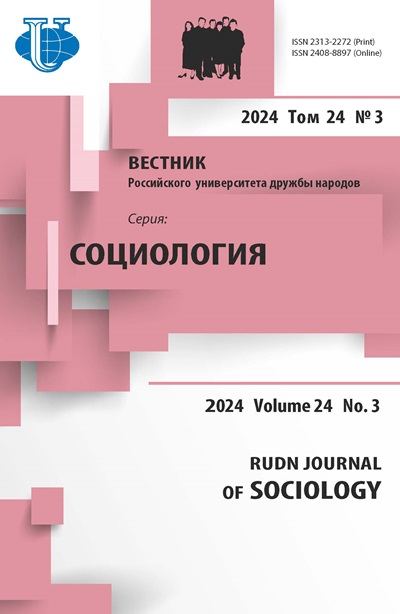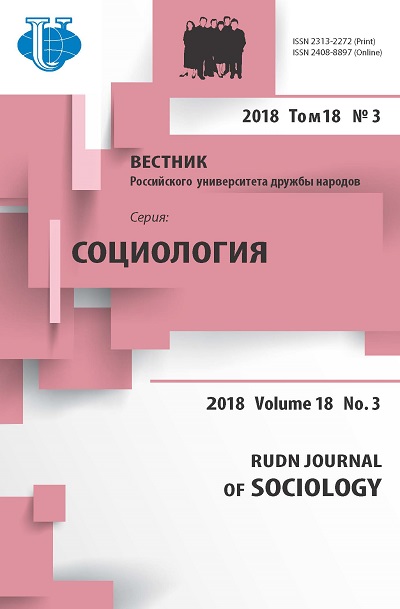TECHNOLOGICAL SYSTEM AND A PARISH COMMUNITY
- Authors: Podlesnaya MA1
-
Affiliations:
- Saint Tikhon’s Orthodox University
- Issue: Vol 18, No 3 (2018)
- Pages: 431-442
- Section: Contemporary society: the urgent issues and prospects for development
- URL: https://journals.rudn.ru/sociology/article/view/19180
- DOI: https://doi.org/10.22363/2313-2272-2018-18-3-431-442
Cite item
Full Text
Abstract
The article considers the issue of how the Orthodox community as the most traditional social community adapts to the contemporary system of technologies. First, the author describes the phenomenon of technological system, identifies its main features, capabilities and limitations. Among the key features of the technological system, the article focuses on decentralization, weakening hierarchy and strengthening horizontal links, flexibility, self-regulation, adaptability, totality and the use of man as an algorithmically acting subject. The author emphasizes that the system approach in sociology plays an important role in the study of technological systems, and N. Luhmann’s approach is relevant for the study of parish communities, though the author mentions the limitations and critique of his works. The article examines contemporary church discourse about modernization of parish communities, which is also determined by the popularization of the views of Luhmann and other representatives of the system approach. The author also focuses on the most important question of the contemporary world under the technological development, which is the future of the mankind, and the article mentions concepts ‘cyborg’, ‘mutant’, ‘clone’, ‘virtual person’, and ‘posthuman’. The author makes a number of conclusions about how the parish community will react to the changes of the mankind, and what the most possible risks for the parish communities are considering such changes. Thus, the transformation of the parish community into a well-managed and well-functioning system or network means its rationalization, which at first seems necessary and solving urgent problems, but then one can see that it deprives the community of its vitality: a man finds himself in the community, but it does not seem to be Christian any more.
About the authors
M A Podlesnaya
Saint Tikhon’s Orthodox University
Author for correspondence.
Email: yamap@yandex.ru
-
Novokuznetskaya St., 23-5A Moscow, Russia, 115184References
- Aksenova O.V. Paradigma socialnogo dejstviya: professionaly v rossijskoj modernizatsii [Paradigm of Social Action: Professionals in the Russian Modernization]. Moscow; 2016 (In Russ.).
- Argamakova A.A. Mezhdu tehnologicheskoj utopiej i antiutopiej: igry i socialnoe proektirovanie [Between technological utopia and anti-utopia: Games and social design]. Epistemologiya i Filosofiya nauki. 2017; 4 (In Russ.).
- Bagrina A.Yu. 30000000 “nedoprihozhan”: obschina, perekhod, prihod, priezd [30000000 ‘not-quite-parishioners’: Community, transfer, and arrival]. Almanah “Lodka”. Moscow; 2016: 196—228 (In Russ.).
- Burgess J. Prihodskaya zhizn v SShA i Rossii: voprosy ob obschine i vosterkovlenii [Parish life in the US and Russia: Questions about the community and churching]. Prihod Russkoj pravoslavnoj tserkvi v Rossii i za rubezhom. Materialy k izucheniyu prihodskoj zhizni Vyp. 2. Otv. red. I.P. Ryazantsev, red.-sost. M.A. Podlesnaya. Moscow; 2013 (In Russ.).
- Velikanov Pavel, prot., Rtishchev Fedor, svyasch. O zhizni prihodskoj [On the life of the parish]. http://www.bogoslov.ru/text/4408505.html (In Russ.).
- Vorontsova E. Teologicheskaya retsepciya sociologii religii Niklasa Luhmanna: Materialy seminara “Sociologiya religii” [Theological reception of the sociology of religion by Niklas Luhmann: Proceedings of the seminar “Sociology of Religion”]. http//:socrel.pstgu.ru (In Russ.).
- Guryanov V.N. Niklas Luhmann: obschestvo kak autopojeticheskaya sistema [Niklas Luhmanm: Society as an autopoietic system]. Filosofskie Issledovaniya. 2009; 3 (In Russ.).
- Desnitsky A. Esli my hotim uvidet molodyozh v Tserkvi — nam nuzhno podvinutsya [If we want to see the youth in the Church we have to move]. http://www.pravmir.ru/esli-mi-hotim-uvidet-molodej-v-tserkvi (In Russ.).
- Poslanie prezidenta RF Putina V.V. Federalnomu sobraniyu ot 01.03.2018 g. [Message from the President of the Russian Federation V.V. Putin to the Federal Assembly on March 1, 2018]. https://ria.ru/politics/20180301/1515501294.html (In Russ.).
- Rtishchev Fedor, svyasch. K utochneniyu ponyatiya “prihod otkrytogo tipa” [Clarification of the term an ‘open parish’]. http://www.bogoslov.ru/text/4524604.html (In Russ.).
- Urri J. Sociologiya za predelami obschestv. Vidy mobilnosti dlya XXI stoletiya [Sociology Outside Societies. Types of Mobility for the 21st Century]. Moscow; 2012 (In Russ.).
- Fukuyama F. Nashe postchelovecheskoe buduschee [Our Posthuman Future]. Moscow; 2004 (In Russ.).
- Habermas J. Otnosheniya mezhdu sistemoj i zhiznennym mirom v usloviyah pozdnego kapitalizma [Relations between the system and the life world under the late capitalism]. THESIS. 1993; 2 (In Russ.).
- Khorugy S.S. Postchelovek, virtualnyj chelovek i ih socium [A post-man, a virtual man, and their society]. Vestnik MGOU. 2016; 3 (In Russ.).
- Khorugy S.S. Russkaya religiozno-filosofskaya mysl ob izmeneniyah cheloveka pod vozdejstviem tekhnogennoj sredy [Russian religious-philosophical thought on human changes in the technogenic environment]. http://www.bogoslov.ru/text/4551920.html (In Russ.).














